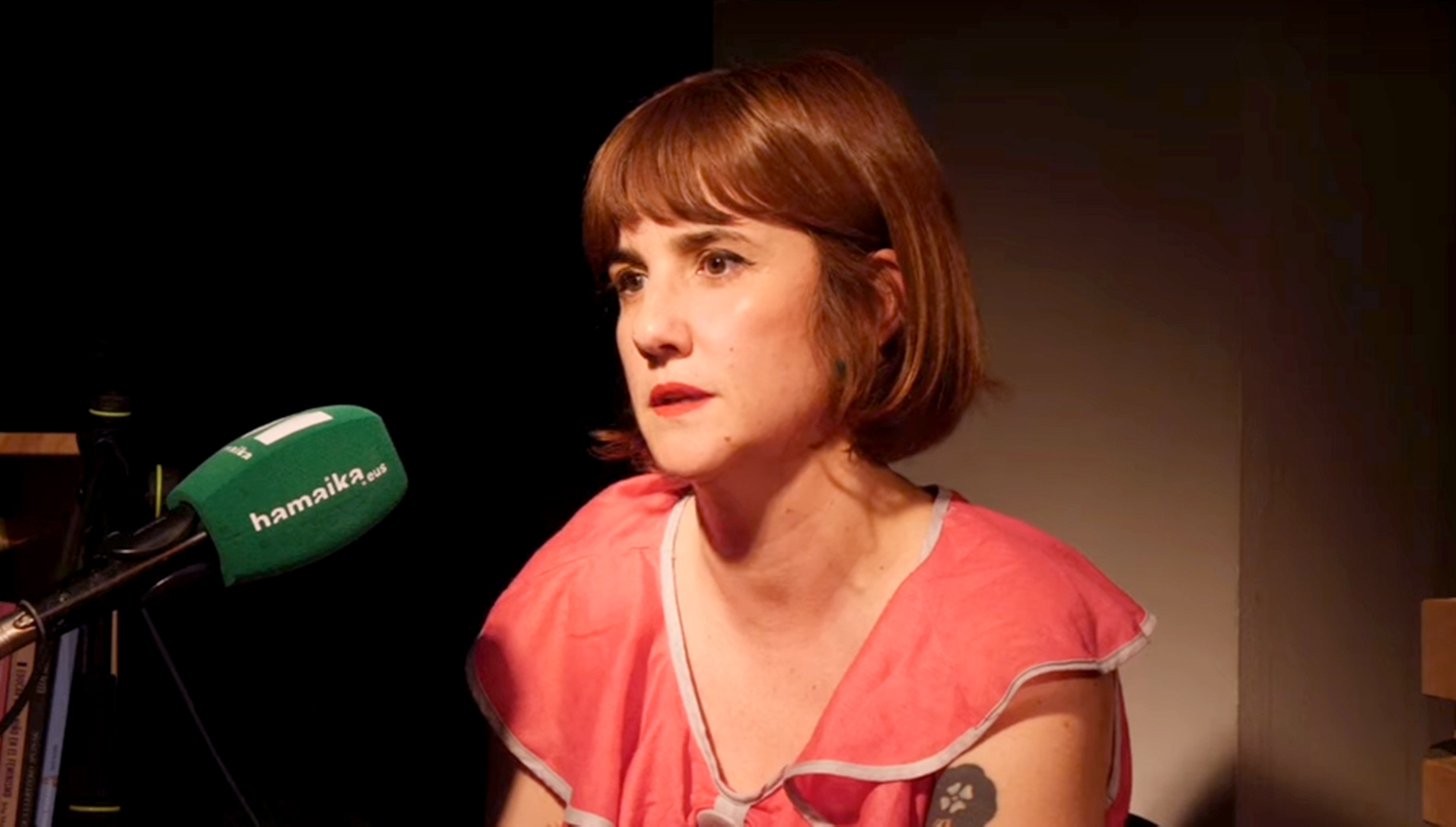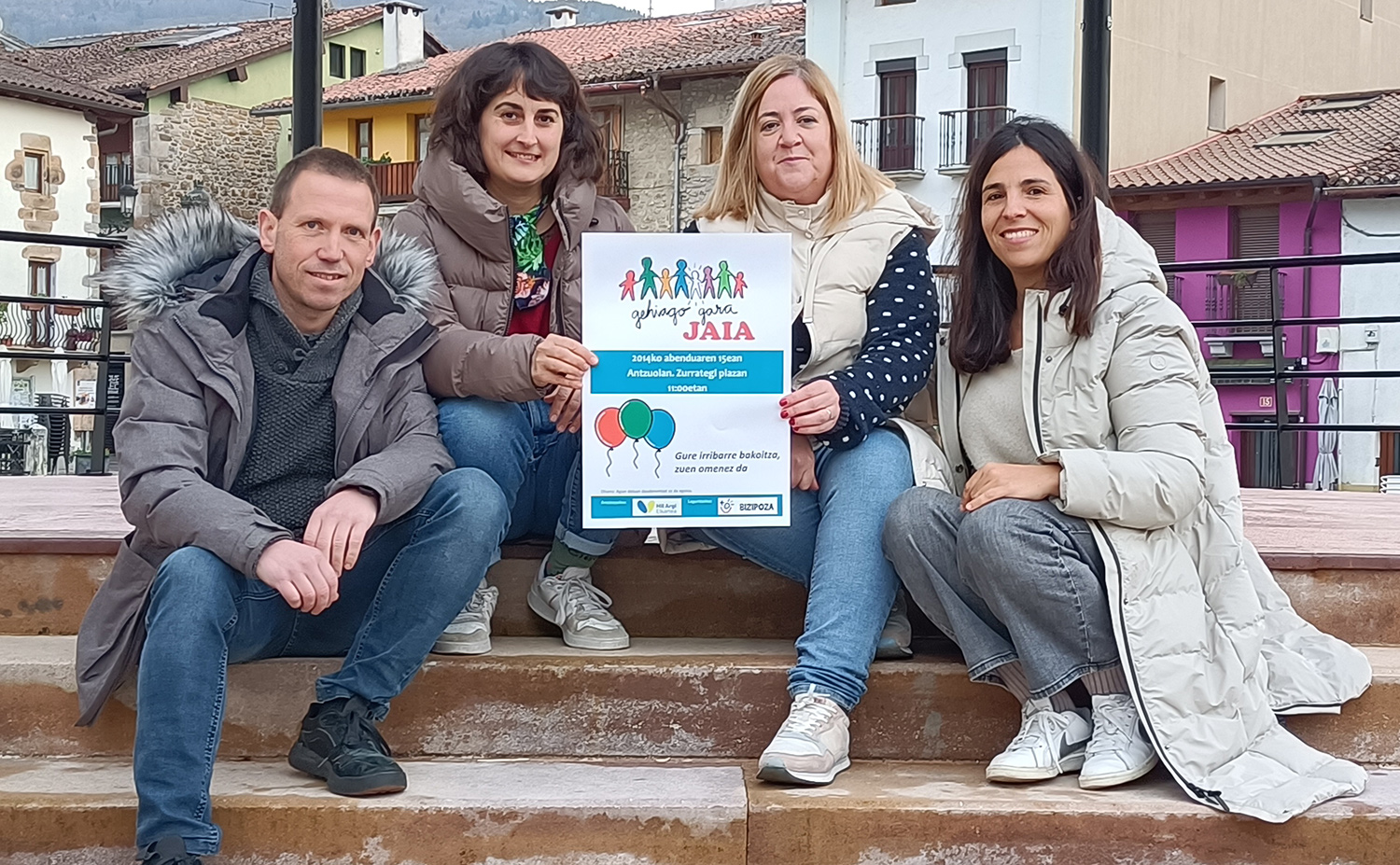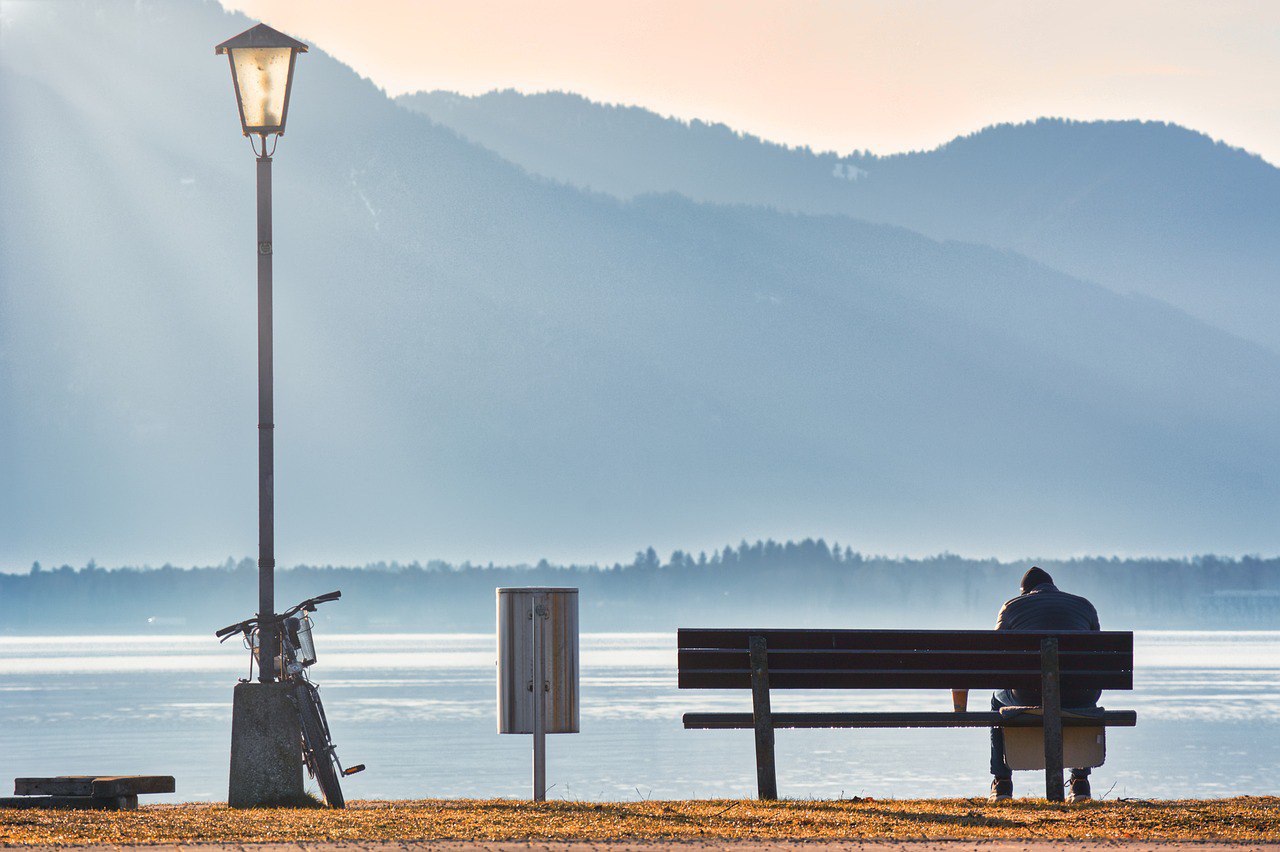"In the face of death, well-being is now being violated more than before"
- Looking outward we all want to show the best image. We are forced to be strong, optimistic and seasonal, even when we have enough reason to be sad. You have to live the pain, the grief, that produces death in order to overcome it.
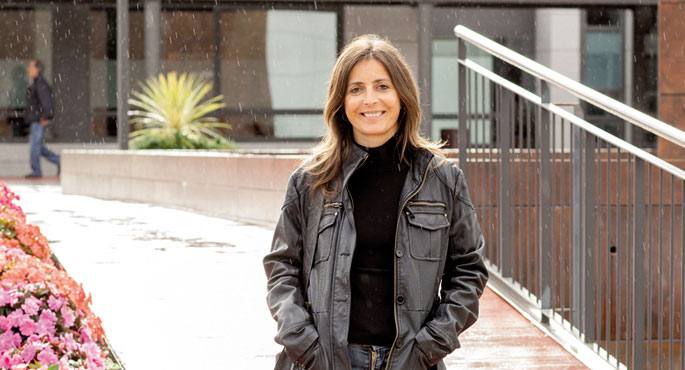
You worked around mental health in the ANASAPS association.
Yes, everything. I started in Doneztebe. We saw that in our environment there was no proper service for people with psychic problems. Once a month, they only came to help them from the Region of Pamplona, Burlada. So a family member and I created the Dizdira Association. Shortly afterwards, we were called from ANASAPS asking if we wanted to join the association. Then I came to Pamplona with the aim of launching new projects and awareness programmes. Among the programs developed, the one I was most interested in was the one we did in the prison in Pamplona. I was coming in every week to see prisoners with mental illness. Now, I think, you have canceled it for lack of money, unfortunately.
Are there many prisoners affected by these diseases?
A lot. In addition, we have to think about why they are in jail in some cases: because the disease already exists. And inside, they're worse, although in terms of medicine, in general, they're controlled, in jail, they need more help.
In 2009, he started at the Senda Foundation. Difficult task?
The first week I said, "This is too much, it's terrible. I don't want to. I go home.” The beginnings were hard by the cases. I remember the first one: the woman came and a man who had just lost his two children. I thought, "And is this so every day?" Too much for me!” I was going home crying, I couldn't disconnect. At first it made me hard, but after a few months I decided to stop.
Now does he manage to look differently?
Yes, but there are cases you cannot forget: when the deceased is young people or due to an accident, it is harder.
What services do you provide here at the Fundación Senda?
We have two main objectives: on the one hand, to help the person in a given situation, and on the other hand, to disseminate awareness messages so that people see that grief can be worked, that people do not have to live alone. There are people who overtake without help and there are others who need help. We inform you that there is a service for this. We offer individualized care and group sessions, either directly or through different private centers in Navarra that work with us. Over the years we have seen that working as a group helps a person a lot by making him see that he is not alone and that such misfortune has not occurred to him alone. In addition, we organise conferences at the end of October and offer training services to professionals from different areas.
Are these help sessions free of charge?
Normally EUR 50 is paid for the sessions, but if someone has any problems, they will be able to receive it free of charge with a report from the Social Services. For us it would be best to offer it for free, but in this time of crisis it is difficult.
How has the grief lived so far?
At home and alone. I always say: grief doesn't have to work for everyone. There are people who almost beat people without help, but when they don't, sometimes we think that that's enough with a pill and enough. But to overcome it, grief has to live it. It's not a critique, but I think you're given too easily antidepressants, anxiolytics and other medicines to take pain away from grief, and that's often not necessary. If we cover up feelings, will they come sooner or later, or what? Do you take pills all your life? There are many people who come with these kinds of concerns and ask whether they have to take the pills or not. I always tell them that taking medicines is good when you can’t do your normal life: you can’t get out of bed, you can’t eat, you can’t sleep… So, when they’re absolutely necessary, yes. But it's not just because you're sad. It's normal for me to be sad because you've lost the person you loved.
There are no magic formulas to overcome grief. The question is usually a regular one to know how long it takes to get it. Some experts say that two years, three years -- it's different. It can be said that if five years later you have not yet managed to return to your normal life, you run the risk of that grief becoming pathological. But all of that depends on the person.
What does your work consist of?
What we do is help us in this grieving process, being next door. Let the person see that they're not alone. Listen. In the end we do nothing and on many occasions we cannot answer the person’s doubts and questions. Many times they have to explain what has happened. Sometimes they have unfinished questions or questions, for example, that day you were angry with the person who later died, or they had something to say to him and they didn’t... All of that, the things that remain in the inkwell, we worked them. Above all, listening and advising little.
The truth is that when these kinds of accidents happen, someone comes right away to tell that person that they have to be or have to do something that I don't know how many things to do and not think about. But that doesn't improve grief. It’s better to be there, go for a walk with him, go ahead without waiting for them to call you and go home… Those small but eranginous things are in our hands if you want to help.
Are there different phases in the grieving process?
We talk about the duties of the person who feels, rather than about phases. With this we mean that they have an active role in their process, based on the theory of expert Worden. The obligations mainly focus on four:
1- Accept that the person you love has died and will not come back. Hard, but that's it.
2- Expression of feelings. Feelings are mixed in mourning: anger, sadness, tiredness, relief, etc. Everything that we can do must be taken out, because what is left inside is harmful.
3- We have to learn to live without the person we love. In many cases, moreover, the one who remains will have to do the things that the one who left did. For example, he thinks that a woman is killed by her husband and that he does not deal with banking matters. Now he has to do it himself and so it can happen with a thousand things.
4- Finally, we must channel our lives and have illusions again. We have to recover the desire to live, with enthusiasm and defining objectives. We must try to broaden relations and seize opportunities.
These are all steps that the person has to learn. When you do this process and can speak without distress of the deceased person, you can say that you have overcome the grief.
Do you also address the issue of grief with children and young people?
In teaching, we have started to take some initiatives. Two years ago, I ran a pilot program at Roncal School and Institute to work preventively on grief or loss. There are many losses throughout life and not just death. Since we were born, we lost things, health, skills, relationships… We were with students of all ages, from the youngest to the 18 years old. We used books, films, interviews… and the experience was very nice. Teachers, parents and students entered very well into this program that lasted several months. We've been called from other colleges after something happened. To do something like a dimmer. When they lost a father in Bera, or when a student died in Mendavia, in addition to school. What we have worked on in these places has been a greeting. They made letters, drawings, tributes to the attendees and it was very profitable. Teachers find it very difficult to cope with such situations. Suddenly, if a boy or a girl wears, she wonders, "What do I have to do?" They lack resources. What we do is we prepare them and deliver them. We do not work directly with the students, but pass materials to the teachers.
How do you tell a child that a person has died?
Don't lie. A mother told the children that her father was traveling and the children didn't understand why she didn't come back and also always feared that she wouldn't come back when the mother left. Explanations of age must be sought. You have to see at what point in the cognitive process the child is, and to know what is best is to listen to their questions. When there is a death in the family, children often stay out. Don’t come to church, don’t come to cemetery… And why not? If the father is missing, for example, why can't he go? Why not say goodbye? Why not write you a letter or put a drawing in your coffin? I believe that adults have a terrible fear and that is what we pass on to children. They will take it normally if we take it that way. To do so we must be clear that death is part of life. We have to let children live closer to death. They shouldn't be forced to participate or see the body, but they shouldn't be pushed aside either. To do so, they will be informed in advance of what they are going to find, which means that the person is dead.
Religious messages are often mixed up. What should we do?
These are the contradictions of adults. It is difficult to explain to children and even more difficult when there are different views in the environment. I believe that we must try to be as consistent as possible and, above all, to say clearly what we feel. If we think that with death everything ends and that there is nothing else to say, while we believe that there is something else to express calmly.
Has the way of living grief changed a lot?
I do not think so. You live a lot in loneliness, at home, crying, and then you meet people like you're really good. What has changed is that it is now showing less. When we were little, when someone died, families dressed in black. There were some indicators that indicated how those people were. But today, for better or for worse, that has been lost. Before, there was an indication that a person was not well and was in grief. Well-being is now being violated more than before. Today you have to kill one of your side and within two weeks be happy with your normal life, at work, … In the end what society asks us is that we be in our place as soon as possible and I think that is not good. When a broken arm has its healing process, why not grief? What we feel inside is also a process and needs a treatment.
Do those who believe overcome grief more easily?
I have seen it all: suddenly losing faith to those who were incredibly Christian and beginning to go to church to those who had no faith. It is true that those who really have faith, I don’t care what, in a religion, in a god, in energies, I don’t know what kind of life… they overcome it more easily.
Are rites important?
They're very important. For example, when someone dies and doesn't recover the corpse, that grief is harder, because you haven't seen it physically and you can't see if it's actually died.
In other times there was a kind of party after the burial.
In Euskal Herria it has always been done. I have come from a small town, from Etxalar, and coming from the cemetery, there was a snack in the inn, until recently. It helps decrease tension.
In Euskal Herria we are ashamed to cry, show the pain…
We find it difficult to express the pain and sometimes it happens that at first you tell others what you feel, but there comes a time when others tell you that it is enough and that it is time to move on. Then you run out of space and without space to express your feelings. That's what the Senda Foundation offers: a place to talk about the person and the feelings of the past.
“Heriotzan noiz edo noiz pentsatzea ongi etortzen da gehienbat beste modu batez bizitzeko. Sendan lan egiten dudanetik zerbait aldatu da nire buruan. Lehen banuen hilezkortasun sentsazio moduko bat. Gaztea naizela eta niri ezin zaidala deus gertatu uste nuen. Orain, aldiz, heriotzak ez duela adinik ikusten duzu, eta hasten zara pentsatzen bizi behar duzula, ez duzula biharko utzi behar gaur egin dezakezuna. Heriotza inguruan, gertu, ez badugu izan, iruditzen zaigu 90 urtera arte bizi behar dugula edota inoiz ez garela hilko”
Etxalarren sortua (1971-08-28), Beran bizi da. Psikoterapeuta da Irache Tanatorio Taldeak sustatutako Senda Fundazioan (www.sendafun.org). Heriotzak pertsonei sortzen dien oinazea gainditzen laguntzea da bere eguneroko lana. Hemen baino lehen, 2003tik 2009ra arte, gaitz psikologikoak dituzten gaixoekin aritu zen lanean ANASAPSen, Osasun Mentalerako Nafarroako Elkartean.
These were my last words when we left, held hand in your deep breathing sleep. Your heart stayed forever without a special, simple, dignified pain. As you want and demand. How we want and respect.
Already a month before the arrival of winter, the last days of the longest night,... [+]
First of all, we wish to extend our condolences to the family and friends of the woman killed in early August.
The people of Gaintxurizketa are fed up with the disillusionment of the administration and those responsible.
Those of us who live in the neighborhood are forced to... [+]
Paris 1845. The Labortan economist and politician Frédéric Bastiat (1801-1850) wrote the satire Pétition des fabricants de chandelles (The Request of the Sailing). Fiercely opposed to protectionism, he ironistically stated that the sailing boats asked for protection against... [+]
(Azken aldi luzean ezin naiz gauez atera, eta arratsaldez ere larri, eta asteburuetan ere ez, eta (jarri zaizue jada ihes egiteko gogoa), marianitoak eta bazkari azkar samarrak izaten dira nire enkontruneak. Konpainiak ondoegi aukeratu behar ditut. Ezin ditut poteoak... [+]









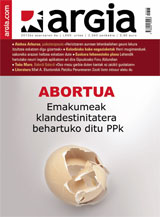

.jpg)
